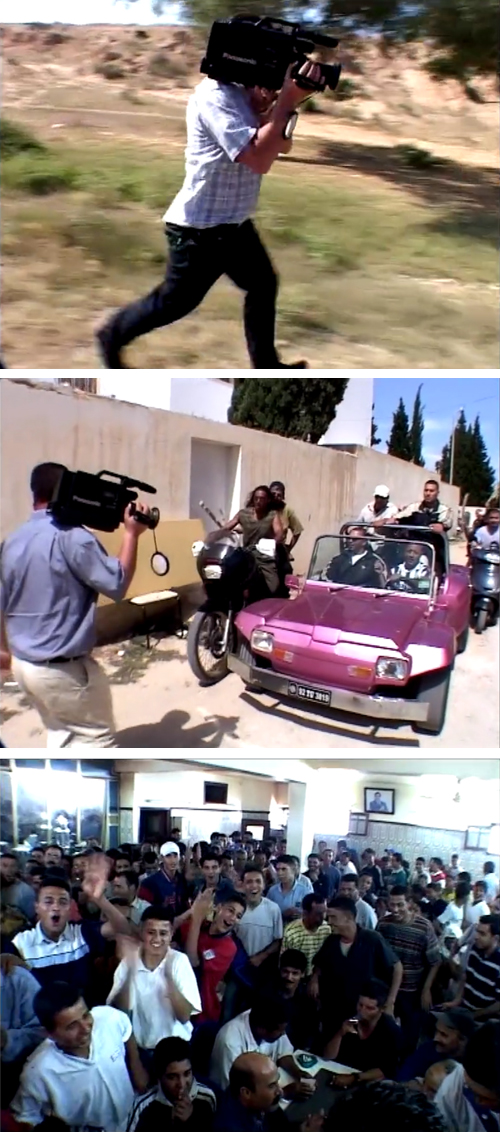Presented in collaboration with Penn Museum
VHS Kahloucha endearingly chronicles Tunisian housepainter and amateur filmmaker Moncef Kahloucha and the low-budget VHS production of his feature, Tarzan of the Arabs. In this award-winning feature documentary, director Nejib Belkadhi not only captures Kahloucha’s passion for Hollywood genre films and his ingenuity given his limited resources – just one camcorder and two edit decks, but he also offers a glimpse into the lives of the Sousse locals who double as actors, cameramen, and stuntmen. VHS Kahloucha was selected for the Sundance Film Festival in 2007, the Dubai International Film Festival in 2006 (Best Documentary), the FIDMarseille in 2006 (Public Libraries Prize), and the Sharjah Biennial 9 in 2009.
Following a screening of the film, director Nejib Balkadhi joins remotely for a conversation with Penn Middle Eastern Studies scholar Radwa El Barouni. Introductions by Penn Museum media and film archivist Kate Pourshariati.
Cosponsored by Penn's Department of Cinema and Media Studies, Department of Middle Eastern Languages and Cultures, and Center for Experimental Ethnography, and Al-Bustan Seeds of Culture.
 Nejib Belkadhi began his acting career at Canal+ Horizons as a showrunner, director, and host of his award-winning TV show, Chams Alik. In 2002, he founded Propaganda Productions with his friend Imed Marzouk. Their first collaboration was the successful fake reality show Dima Lebess, in which Belkadhi follows an average family in their everyday life. In 2006, his feature documentary movie VHS Kahloucha was selected in more than 50 festivals, including a world premiere at Cannes and a selection in the official competition at Sundance. The film won seven international awards, including the Golden Muhr at the Dubai International Film Festival. His most recent feature film, Bastardo, premiered at the Toronto International Film Festival and was selected for the official competition at the Cinemed Montpellier in 2014. The film was screened in 40 festivals and won 11 awards, including Best Film at the African, Asian, and Latin American Film Festival of Milan, the Tetouan International Mediterranean Film Festival, and the Alexandria Film Festival. In 2018, he released his film Look At Me, which premiered at the Toronto International Film Festival and won ten international awards, with selections in more than 50 festivals. His newest work, released in December 2021, is the self-produced Communion, shot entirely during the lockdowns at the beginning of the COVID-19 pandemic. It premiered in competition at the Red Sea International Film Festival and won Best Foreign Film at the New York City International Film Festival and Best Film at the Luxor African Film Festival.
Nejib Belkadhi began his acting career at Canal+ Horizons as a showrunner, director, and host of his award-winning TV show, Chams Alik. In 2002, he founded Propaganda Productions with his friend Imed Marzouk. Their first collaboration was the successful fake reality show Dima Lebess, in which Belkadhi follows an average family in their everyday life. In 2006, his feature documentary movie VHS Kahloucha was selected in more than 50 festivals, including a world premiere at Cannes and a selection in the official competition at Sundance. The film won seven international awards, including the Golden Muhr at the Dubai International Film Festival. His most recent feature film, Bastardo, premiered at the Toronto International Film Festival and was selected for the official competition at the Cinemed Montpellier in 2014. The film was screened in 40 festivals and won 11 awards, including Best Film at the African, Asian, and Latin American Film Festival of Milan, the Tetouan International Mediterranean Film Festival, and the Alexandria Film Festival. In 2018, he released his film Look At Me, which premiered at the Toronto International Film Festival and won ten international awards, with selections in more than 50 festivals. His newest work, released in December 2021, is the self-produced Communion, shot entirely during the lockdowns at the beginning of the COVID-19 pandemic. It premiered in competition at the Red Sea International Film Festival and won Best Foreign Film at the New York City International Film Festival and Best Film at the Luxor African Film Festival.
 Radwa El Barouni received her masters and PhD from the University of Texas, Austin in Middle Eastern Studies with a focus on Middle Eastern Languages and Cultures. Her dissertation focused on a dynamic archive of historical fiction produced in the late 19th–21st centuries, analyzing how the works problematize and process their subjects’ relationship to their pasts, presents, and potential futures. She critically examined the works’ — through their staging of al-Andalus — intervention in official in/accessible archives, dominant historical narratives, and forms of historical consciousness, reimagining both the world they represent and the genre of the historical novel itself. In addition to historical fiction, El Barouni’s other research interest focuses on the depiction of non-human animals in Arabic and Persian texts, and the configuration of their place in and relations with humans and the surrounding environments in both theocentric and non-theocentric paradigms.
Radwa El Barouni received her masters and PhD from the University of Texas, Austin in Middle Eastern Studies with a focus on Middle Eastern Languages and Cultures. Her dissertation focused on a dynamic archive of historical fiction produced in the late 19th–21st centuries, analyzing how the works problematize and process their subjects’ relationship to their pasts, presents, and potential futures. She critically examined the works’ — through their staging of al-Andalus — intervention in official in/accessible archives, dominant historical narratives, and forms of historical consciousness, reimagining both the world they represent and the genre of the historical novel itself. In addition to historical fiction, El Barouni’s other research interest focuses on the depiction of non-human animals in Arabic and Persian texts, and the configuration of their place in and relations with humans and the surrounding environments in both theocentric and non-theocentric paradigms.
El Barouni is currently the director and coordinator of the Arabic Language and Culture Program in the Department of Middle Eastern Languages & Civilizations at the University of Pennsylvania. She previously taught Arabic literature, language, and translation at Williams College, Durham University (U.K) and at UT Austin. She was also a consultant for the Flagship Culture Initiative 2018-2019, and has trained faculty for Arabic as a Foreign Language in the Flagship program in Morocco with the American Councils for International Education in 2019.



